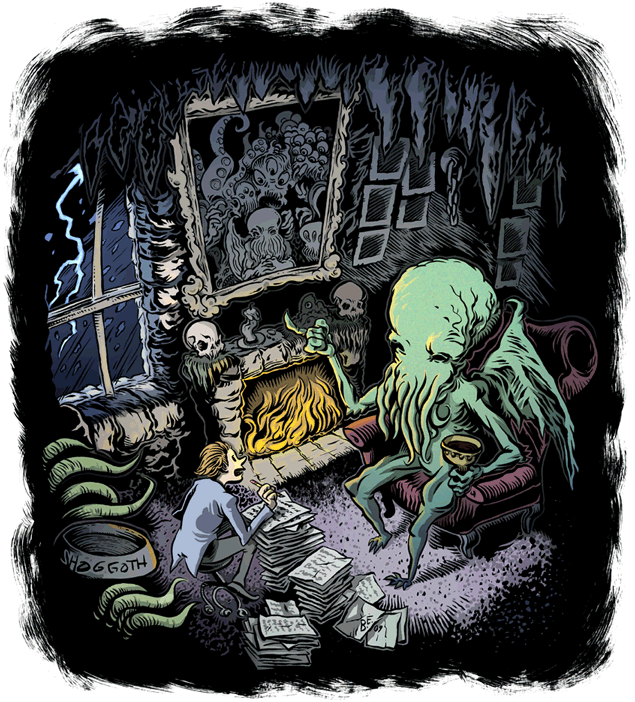In December of 2010, I became frustrated when attempting to find a Nook-compatible eBook, free or otherwise, of the complete works of H.P. Lovecraft. Initially, I used a nearly-complete file from the Australian Project Gutenberg and turned it into a mildly useful but still incomplete and unstructured ebook. That wouldn’t do, so I did what any good librarian-in-training would—I took the time to create a proper complete works eBook and released it to the public.
In the process of creating the eBook, I realized I had the opportunity to discover Lovecraft’s most-used words.
If you’ve ever read him, a handful of words have probably jumped out at you again and again. Perhaps you considered whipping up a bingo card or a tally sheet. Some of the words I think of immediately when someone mentions Lovecraft’s vocabulary are “eldritch,” “squamous,” “cyclopean,” “indescribable,” “decadent,” “unnameable,” and “blasphemous.”
Oddly enough, “squamous” was only used once in an original work (“The Dunwich Horror”). I found it once in a collaboration, but it probably stuck with readers because Lovecraft is the sole author we’ve read who’s used it. The following are the ten words, or root words, which occur most often in Lovecraft’s original writings:
- Hideous – 260
- Faint (ed/ing) – 189
- Nameless – 157
- Antiqu (e/arian) – 128
- Singular (ly) – 115
- Madness – 115
- Abnormal – 94
- Blasphem (y/ous) – 92
- Accursed – 76
- Loath (ing/some) – 71
You can read more of the most-used words and word counts for places, tomes, and characters in my full post on Lovecraft’s favorite words.
Illustration by Brian Elig.
This post originally appeared on Tor.com on March 1, 2011.
RuthX is a mild-mannered librarian by day who serves the dread lord Cthulhu after dark and hopes to work in VERY Special Collections at Miskatonic University’s library, once she gets them to admit it exists.











Even “rugose” got more play than “squamous” — three appearances vs. one. And they didn’t even appear together despite the fact that I’ve always had it in my head that “squamous and rugose” was a description that appeared somewhere. Maybe in a pastiche?
Surely words like ‘the’ or ‘said’ are more common. What criteria are you using?
I was always struck by his continuous use of “foetor.” I’ve heard of “fetid”, but never seen it spelled or used as a noun anywhere other than Lovecraft.
@1: I seem to recall that Charles Stross used some variant of “squamous and rugose” when talking about the Laundryverse.
@2: According to the link, the words to count were suggested by users of Twitter and the H. P. Podcraft forums.
I once analyzed The Lord of the Rings sort of like this: finding the words in each chapter most characteristic of that chapter — most elevated in frequency compared to the rest of the work. Might be fun to do the same to this corpus, for someone who’s more into Lovecraft.
@5 Stross tends to use “squamous and rugose” somewhat tongue in cheek. Of course, he’s referring to nameless horrors from beyond spacetime, so there’s only so much tongue in cheek you can get…
Depends how many tongues and how many cheeks said nameless horrors have, doesn’t it?
I belive the Stross quote goes something along the lines of:
I’m pretty sure it’s from The Jennifer Morgue. The entire Laundy series is packed full of nods to Lovecraft.
Haven’t actually read any of the Laundry books; should probably do something about that one of these days.
Anything about rare or obscure words that Lovecraft used maybe only once? My personal favorite is “frore,” an archaic word meaning something like “frigid,” that he used in “The Colour Out of Space” and nowhere else.
Speak for yourself. Rupert Brooke uses it in his brilliant poem Heaven:
It’s about fishes’ idea of God and the afterlife and is great.
In his introduction, “Of Swordsmen and Sorcerers”, to Flashing Swords #1 (1973), Lin Carter mentions how he, L. Sprague de Camp, and John Jakes created “S.A.G.A” – the Swordsmen and Sorcerers Guild of America, Ltd. Each of them was awarded a title. For de Camp, it was Supreme Sadist of the Reptile Men of Yag. Carter was ennobled as the Purple Druid of the Gibbering Horde of the Slime Pits of Zugthakya. And Jakes took the epithet of (deep breath, now) Ambassador-without-Portfolio to the Partly Squamous, Partly Rugose Vegetable Things of the South Polar City of Nugyubb-Glaa.
That is the pairing of “squamous” and “rugose” that sticks in my tiny cranium.
@12 — I’ve read that book (Flashing Swords #1) often enough that that might be where I’m getting the pairing from, now that you bring it to my attention.
Well, that’s interesting to note. I had noted “blasphemous” as one of the most inappropriate of all the words used: I hadn’t counted the words up to see how many times it appears. (“inappropriate” because in the Mythos, the realities are the frigid depths of space and time which dwarf even Great Old Ones, and you cannot blaspheme the depths of space and time; and “blasphemous” in relation to the human concerns, petty in the face of universal indifference, is kinda like a chihuahua barking at its own shadow.)
Batrachian is another word that I associate with Lovecraft mainly because Lovecraftian fiction was the first (and very nearly only) place I’ve ever seen it used.
It’s never squamous.